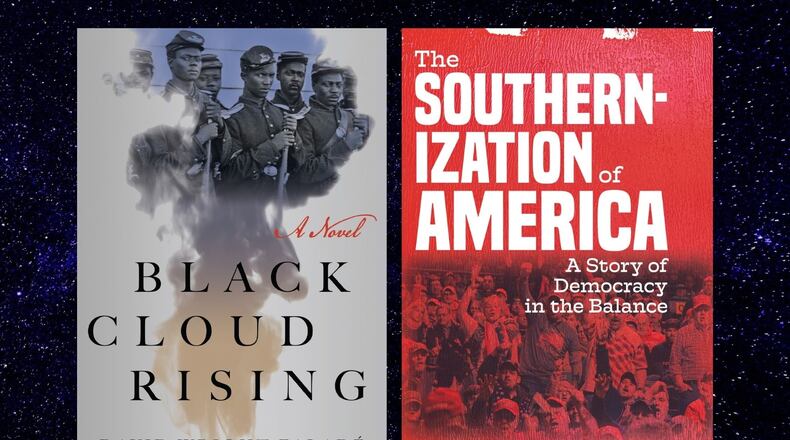Representing genres ranging from biography to historical fiction to essay, here are four illuminating books ideal for reading during Black History Month — or any time of the year.
In the “hidden figures” category of African American scientists and scholars whose significant contributions to their fields of study have previously gone unnoticed, add the name John Wesley Gilbert. His fascinating life story is told in “The First Black Archaeologist” (Oxford University Press, $34.95) by John W. I. Lee, an associate professor of ancient history at the University of California, Santa Barbara.
Born to enslaved parents near Augusta, Gilbert began his education at Paine Institute (now Paine College), the historically black private college established by Methodists in Augusta in 1884. But he completed his bachelor’s degree in 1888 at Brown University, among the first 10 Black students to attend the school.
During his time at Brown, Gilbert also studied at the prestigious American School of Classical Studies in Athens, Greece, the first African American to do so. He went on to become the first Black faculty member at Paine College and helped established a Methodist mission in the Congo, where he spoke out against colonialism.
It may not have the same film-worthy appeal as “Hidden Figures,” but “The First Black Archaeologist” is an interesting look at a pioneer in the field.
Former AJC editorial page editor and Pulitzer Prize-winner Cynthia Tucker partners with Frye Gaillard, a former editor at the Charlotte Observer and author of “A Hard Rain: America in the 1960s,” on a slim collection of seven linked essays titled “The Southernization of America,” (NewSouth Books, $25.95).
Both Tucker, who is Black, and Frye, who is white, were born in Alabama and teach at the University of South Alabama. Together they explore how the South has shaped the political landscape of the United States.
Starting with “Reagan’s dispatch of Jimmy Carter,” “The Fragile Promise” traces what the authors call the “political decline” of the late 20th century when “politics became more than ever the great blood sport of American life.” Among the most avid participants are those who believe “with a blinding righteousness sometimes spilling into hate — that God, most surely, was on their side.”
“In Black Lives Matter and Symbols of the Past,” Tucker delivers a passionate discourse on the rebel flag, and how it and other symbols of racial hatred endure.
Credit: Oxford University Press
Credit: Oxford University Press
“Black Cloud Rising” (Atlantic Monthly Press, $27) is a historical Civil War novel by David Wright Faladé about the African Brigade, a regiment of newly freed slaves who fought against Confederate hold-outs along the coast in North Carolina. Many of the soldiers found themselves in combat with their former owners, and in the process, hoped to free loved ones who remained enslaved.
At the heart of the novel is Sgt. Richard Etheridge, the son of a slave and her owner, who hopes the campaign will lead him back to Franny, the love of his life.
“We’d hardly gone 200 paces past the courthouse when the Clapson farm appeared, across a stretch of unflowered and rustling stems where flax had not so long before been harvested,” writes Faladé. “Cuffee, the runaway, finger-pointed it out. General Wild raised the one good arm and our column halted, the booming footfalls of a sudden still. Though nary a head turned, all eyes peeked as one over at the plantation house across the way that was our target.”
Credit: Gallery Books
Credit: Gallery Books
In the novel “Carolina Built” (Gallery Books, $27), historical romance novelist Kianna Alexander celebrates the life and achievements of Josephine Napoleon Leary. Born into slavery, Leary settled in Edenton, North Carolina, where she honed her business skills and invested in real estate, owning six buildings at one point in her life.
Leary’s crowning achievement was the construction of the J.N. Leary Building, a three story, eight-bay rental property with pressed metal façade and Victorian flourishes, in 1894. It remains a commercial property today.
In this fictionalized version of Leary’s life, Alexander explores the challenges Leary encountered as a Black woman navigating the white man’s world, including obstacles created by her own husband.
“It’s like swimming against the tide every day to stop myself from pursuing my business with the full force of my energies, but my husband would rather I not swim against the tide at all,” Alexander writes. “He’d rather see me out of the water entirely, wrangling our children and watching him delight in the waves from the shore. He does love me. But he doesn’t love my ambition, and it’s an inextricable part of who I am.”
Other recommended reading from books recently reviewed in the AJC, include “The Last Slave Ship” by Ben Raines, “Don’t Cry for Me” by Daniel Black and “The Violin Conspiracy” by Brendan Slocumb.
Suzanne Van Atten is a book critic and contributing editor to The Atlanta Journal-Constitution. Contact her at svanatten@ajc.com, and follow her on Twitter at @svanatten.com
About the Author
The Latest
Featured




